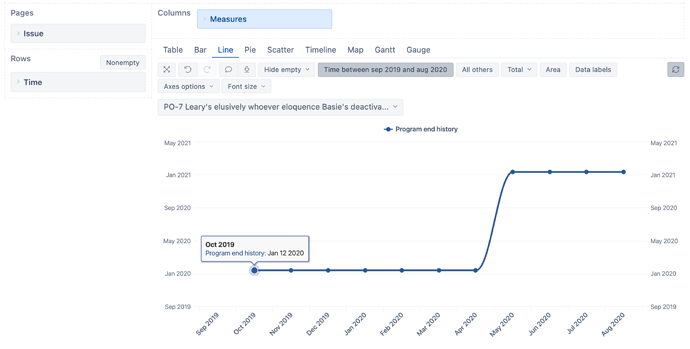Hello,
On this subject, I need extra support .
I started a try with a custom field : free_field_date_01.
I use this code on the base :
[jira.customfield_eetch]
name = “free_field_date_01 timestamp changes”
data_type = “decimal”
measure = true
multiple_dates = true
javascript_code = ‘’’
dateChangeStrings = [];
whenDateChanged = issue.fields.created;//.toString().substr(0,10);
newDateChange = null;
duedateAsTimeChangeStamp = null;
issue.changelog.histories.forEach(function(history)
{ history.items.forEach(function(historyItem)
{ if (historyItem.field == “free_field_date_01” )
{ newDateChange = historyItem.from;
if(newDateChange)
{ duedateAsTimeChangeStamp = Date.parse(newDateChange);
dateChangeStrings.push(whenDateChanged.toString().substr(0,10) + “,” + duedateAsTimeChangeStamp/1000);
dateChangeStrings.push(history.created.toString().substr(0,10) + “,” + -duedateAsTimeChangeStamp/1000);
//dateChangeStrings.push(newDateChange + “" + duedateAsTimeChangeStamp + "” + whenDateChanged.toString() + “_” + history.created.toString());
}
whenDateChanged = history.created; }
});
});
if (issue.fields.customfield_NNNNN)
{
dateChangeStrings.push(whenDateChanged.toString().substr(0,10) + “,” + Date.parse(issue.fields.customfield_NNNNN)/1000) ;
//dateChangeStrings.push(“Test2”);
//dateChangeStrings.push(“999”);
}
issue.fields.customfield_eetch = dateChangeStrings.join("\n");
‘’’
It worked quite well, so we decided to add another timestamp changes base on duedate this time.
As it didn’t works we go back at this previous state and it still works.
Then we remove the previous code and we replace it by the following one :
[jira.customfield_eetch]
name = “duedate timestamp changes”
data_type = “decimal”
measure = true
multiple_dates = true
javascript_code = ‘’’
dateChangeStrings = [];
whenDateChanged = issue.fields.created;//.toString().substr(0,10);
newDateChange = null;
duedateAsTimeChangeStamp = null;
issue.changelog.histories.forEach(function(history)
{ history.items.forEach(function(historyItem)
{ if (historyItem.field == “duedate” )
{ newDateChange = historyItem.from;
if(newDateChange)
{ duedateAsTimeChangeStamp = Date.parse(newDateChange);
dateChangeStrings.push(whenDateChanged.toString().substr(0,10) + “,” + duedateAsTimeChangeStamp/1000);
dateChangeStrings.push(history.created.toString().substr(0,10) + “,” + -duedateAsTimeChangeStamp/1000);
//dateChangeStrings.push(newDateChange + “" + duedateAsTimeChangeStamp + "” + whenDateChanged.toString() + “_” + history.created.toString());
}
whenDateChanged = history.created; }
});
});
if (issue.fields.customfield_NNNNN)
{
dateChangeStrings.push(whenDateChanged.toString().substr(0,10) + “,” + Date.parse(issue.fields.customfield_NNNNN)/1000) ;
//dateChangeStrings.push(“Test2”);
//dateChangeStrings.push(“999”);
}
issue.fields.customfield_eetch = dateChangeStrings.join("\n");
‘’’
This one do not work at all ! The duedate timestamp changes is never updated in the base when I change duedate in JIRA.
What could be wrong in what we’ve done ? It works once and since, impossible to make it works !
Hope I explain myself clearly, thank you in advance for your help,
 .
.
